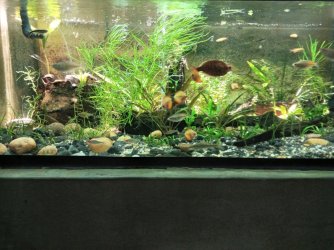Assuming he can maintain water quality and keep his plants healthy enough without the use of ferts. Therein lies the issue. Plants don't grow in discus habitat. Number one, the water is generally too warm. Number two, there is not enough light. The only plants you see in discus habitat are terrestrial plants submerged during the floods, and all of those are dying as is evidenced by the thick covering of brown algae.
More importantly, the water is nearly free of bacteria and constantly being replenished. If he can replicate these conditions, he can absolutely grow out discus juveniles.
We've had this discussion before; the plants i have are growing quite well in discus aquarium with minimal care. Please stop repeating a false hood.
As for the discus - i've been feeding mine greens (algae max, bug bite for bottom feeders, ...) mixed with freeze dried black worms and a touch of bio-gold and tetra bite; it took them a couple of days to start eating after i received them and now a month later they never hide or have a problem with the lights or myself (these are wild caught discus - tank raised might be different); they definitely prefer the freeze dried black worms and go after them first but will graze on the other stuff. I try to limit the amount of worms to one cube per feeding (two feedings a day) shared by 10 near adult discus.
Now to be truthful i've only had them for around 2 1/2 months so i can't say i'm a success yet - check back in 5 years but so far things are going well; this is a repeat of the earlier picture and i should take a new one to show the continued plant growth. The plants have been in there for approx 4 months (i set the tank up before i received the discus and populated it with cardinals). It has wild caught blue rams, wild caught a. lineata (only 1 pair), 6 blue rams and one small L204 along with the 10 discus.
I do not claim to be an expert but i have watched the change in discus behavior from extreme nervousness to very typical 'feed me' cichild behavior over the course of time. They can be startled if you do something in the tank while their head is turned; but as long as they can see you and you aren't overly aggressive in your movement they will gladly let you push them over so you can attend to the plants et all.
As for growth not shown in the picture the a. cirpus ( a very good plant for warm waters) has double in height - the purple tint plant on the left.
The vals need occasional pruning to keep them from spreading across the tank (the ones doing better are on the far right) the various species of echinodorus continue to grow and convert from emersed to submersed - this process can take a year - and the anubia has some new leaves.
Now not every plant has done well a couple of species of echinodorus did die (I think 2) whether it was due to heat or just bad plants i could care less - i have htat issue in every aquarium from 74 to 84.
Of course there are plants that won't do well @ 84 and i don't claim every plant does well. Also the frogbit and red root floaters at the top have double to triple density (which is max out as i remove it as it get denser); of course the discus don't object to the clouds.


